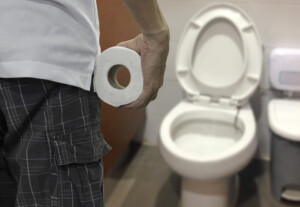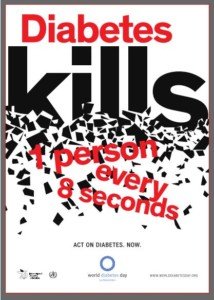
One of the classic symptoms of untreated diabetes is the so-called excessive urination.
Definition of Urinating too Often or too Much
“If you are urinating more than normal for you, get yourself checked,” says Susan L. Besser, MD, with Mercy Medical Center, Baltimore, and Diplomate American Board of Obesity Medicine and board certified by the American Board of Family Medicine.
Having to use the loo too often is a relative concept.
Dr. Besser explains, “There is no ‘too often,’ as some people urinate more than others just because every body is different. If your habits suddenly change, get checked.
“It may not be diabetes; it might be a urinary tract infection, but you won’t know if someone doesn’t evaluate you and your urine.”
Ideally you’ll want to establish a baseline of what’s normal for you, as far as frequency of urination, before you begin fearing that you might have diabetes.
How to Establish a Baseline for Urination Frequency
So let’s assume you have no reason to believe you might have diabetes. Every time you urinate, document this.
You’ll likely find that on days you exercise (and thus drink more water), everything still tends to balance out by bedtime.
However, don’t feel you must run to the john every time you think you can excrete a little trickle just because you’re documenting the frequency.
Just go when nature truly calls you to.
Do not withhold water in the name of seeing if you could get by on a maximum number of trips to the toilet in a single day. If you’re thirsty, drink up.
Overnight Urination Interrupting Sleep
There’s no need to document nocturnal trips to the toilet. Just document from your first trip in the morning to your last one before bedtime.
However, there are people who must “go” three, even five times overnight, but don’t have this correlating frequency during the day.
This does not indicate diabetes. But it IS highly predictive for sleep apnea!
Nocturia—having to urinate more than once overnight even though evening fluid consumption is limited—may be a symptom of untreated sleep apnea.
Nevertheless, what brought you here is a concern about diabetes and excessive urination.
Establish your baseline of frequency, then this way, you’ll objectively know if there’s an increase in how often you must relieve yourself.
If there’s an increase for one day, don’t panic. See if there’s a new baseline before you begin worrying about diabetes.
If you’ve noticed an increase in urine output (either urine volume or frequency) but do not have any objective documentation, see a doctor. A test for diabetes is so easy to get done.

Additional Symptoms of Untreated Diabetes
• Excessive thirst out of proportion to fluid intake
• Unexplained fatigue; new-onset fatigue
• Unexplained increase in hunger
• Unexplained weight loss, especially if food intake has increased
• Blurry vision
• Dry mouth (not from thirst)
• Itchy skin
• Yeast infections
• Slow healing sores or cuts
• Fruity or candy smelling breath
For more on nocturia caused by the life-threatening condition of sleep apnea (and it’s a myth that only fat men get this very overlooked condition):
 Dr. Besser provides comprehensive family care, treating common and acute primary conditions like diabetes and hypertension. Her ongoing approach allows her the opportunity to provide accurate and critical diagnoses of more complex conditions and disorders.
Dr. Besser provides comprehensive family care, treating common and acute primary conditions like diabetes and hypertension. Her ongoing approach allows her the opportunity to provide accurate and critical diagnoses of more complex conditions and disorders.
 Lorra Garrick has been covering medical, fitness and cybersecurity topics for many years, having written thousands of articles for print magazines and websites, including as a ghostwriter. She’s also a former ACE-certified personal trainer.
Lorra Garrick has been covering medical, fitness and cybersecurity topics for many years, having written thousands of articles for print magazines and websites, including as a ghostwriter. She’s also a former ACE-certified personal trainer.
.




































